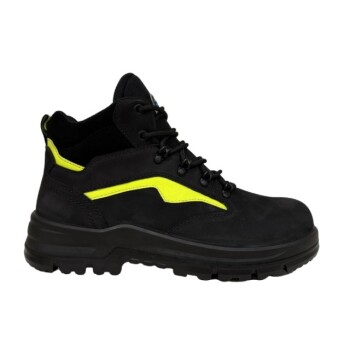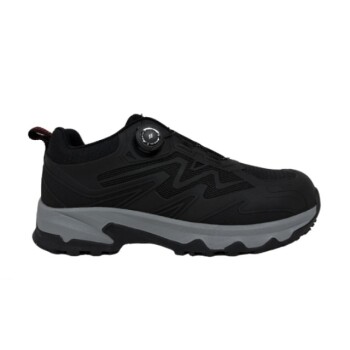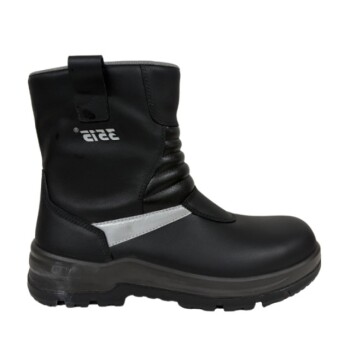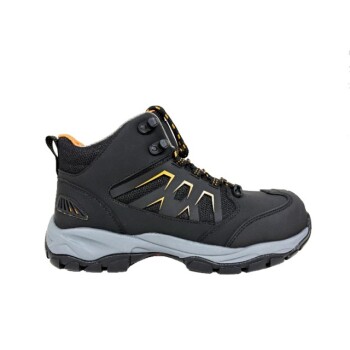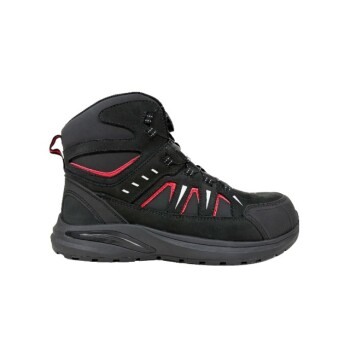At its core, wearing safety shoes is a critical preventive measure in the workplace because they are a foundational piece of Personal Protective Equipment (PPE). They serve as the first and most direct line of defense for your feet against a wide range of hazards, from falling objects to electrical shocks. With foot injuries accounting for 7% of all workplace accidents, proper safety footwear is non-negotiable for mitigating risk and ensuring worker well-being.
The importance of safety shoes extends far beyond simple protection. They are an essential component of a comprehensive safety program that ensures legal compliance for the employer, prevents costly lost workdays, and directly contributes to a more productive and secure work environment.
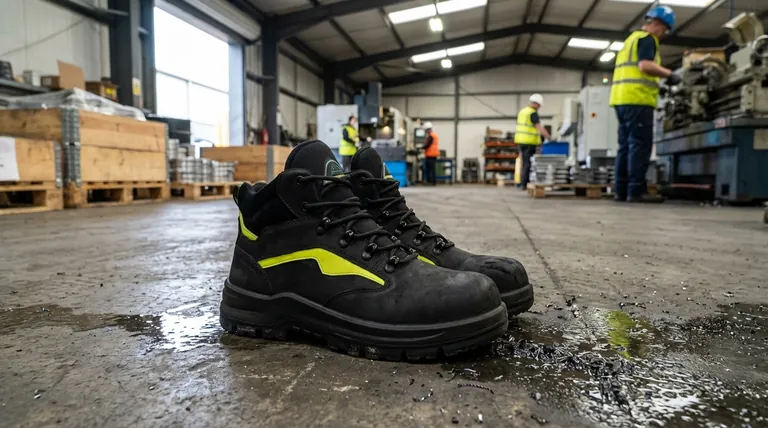
The Primary Role: Shielding Against Physical Hazards
Safety footwear is engineered to counter the most common and immediate physical threats present in many industrial and manual labor settings.
Protection from Impact and Compression
The most recognized feature of a safety shoe is its reinforced toe, typically made of steel or composite materials. This protects the foot from injuries caused by falling objects or compression from heavy rolling equipment.
Guarding Against Punctures
Many work environments, like construction sites, contain sharp objects such as nails, screws, and metal shards on the ground. Safety shoes with puncture-resistant midsoles prevent these items from penetrating the sole and causing serious injury.
Preventing Slips, Trips, and Falls
Slips and falls are among the most frequent causes of workplace accidents. Safety shoes are designed with specialized, high-traction outsoles that provide superior grip on wet, oily, or uneven surfaces, significantly reducing this risk.
Beyond Impact: Protection from Specialized Dangers
Modern safety footwear is highly specialized, offering protection against a variety of less obvious but equally dangerous workplace hazards.
Defense Against Electrical Hazards
In environments where workers may be exposed to live electrical circuits, specially designed safety shoes can insulate them from the ground, preventing electricity from completing a circuit through the body.
Resistance to Chemical and Thermal Risks
For those working in laboratories or chemical plants, certain safety shoes are made from materials that resist degradation from chemical spills. Likewise, heat-resistant soles (often with an "Hro" classification) protect workers in high-temperature environments like welding or paving.
Understanding the Responsibilities and Pitfalls
Implementing a safety footwear program is a shared responsibility, and misunderstanding these roles can lead to significant consequences.
The Employer's Legal Obligation
Employers are legally required to assess workplace hazards and provide, maintain, and replace appropriate safety shoes for their employees at no cost. Failure to do so can result in significant penalties during labor inspections and demonstrates a failure to adhere to safety protocols.
The Employee's Critical Role
While the employer provides the equipment, the employee has a clear responsibility to wear the designated PPE in all high-risk areas. Compliance is not optional and is essential for personal safety.
The "One-Size-Fits-All" Misconception
Not all safety shoes are created equal. Different industries require different levels of protection, indicated by safety ratings. A shoe appropriate for a warehouse may be completely inadequate for a chemical plant.
Choosing the wrong type of shoe provides a false sense of security and can leave a worker exposed to specific environmental risks.
The Business Case for Safety Footwear
Investing in the correct safety footwear program is not an expense; it is an investment in operational stability and employee welfare.
Reducing Costly Injuries and Lost Time
According to the National Safety Council, over 50,000 foot injuries occurred in a single year, leading to lost workdays. Preventing these incidents protects employees and avoids the significant financial drain associated with decreased productivity and workers' compensation claims.
Demonstrating a Commitment to Safety
Providing high-quality, appropriate PPE shows a tangible commitment to worker safety. This builds trust, improves morale, and strengthens the company's safety culture, reducing the likelihood of future incidents.
Making the Right Choice for Your Environment
To ensure effective protection, the safety shoe must match the specific hazards of the job.
- If your primary focus is construction or mining: You need maximum protection, so look for S3 or S5 rated shoes with toe protection and puncture resistance.
- If your primary focus is the agri-food industry: S1 or S1P shoes may be sufficient, but prioritize features like anti-slip or insulated soles.
- If your primary focus is working in chemical labs: S1 or S2 rated shoes will provide the necessary chemical resistance and toe protection.
- If your primary focus is automotive work or welding: S1 shoes with a specific Hro classification are essential for protection against heat-related risks.
Ultimately, investing in the correct safety footwear is a direct investment in the health and productivity of your most valuable asset: your people.
Summary Table:
| Hazard Type | Safety Shoe Protection | Common Industries |
|---|---|---|
| Impact & Compression | Reinforced steel/composite toe cap | Construction, Warehousing |
| Punctures | Puncture-resistant midsole | Construction, Demolition |
| Slips & Falls | High-traction, anti-slip outsoles | Food Processing, Manufacturing |
| Electrical Hazards | Electrical hazard (EH) rated soles | Electrical, Utility Work |
| Chemical & Thermal Risks | Chemical-resistant materials, Hro rated soles | Chemical Plants, Welding |
Protect your team with the right safety footwear. As a large-scale manufacturer, 3515 produces a comprehensive range of certified safety shoes and boots for distributors, brand owners, and bulk clients. Our production capabilities ensure you get the precise protection your workforce needs, from basic S1 ratings to specialized S5 models. Contact us today for a consultation and let us help you build a safer, more productive workplace.
Visual Guide
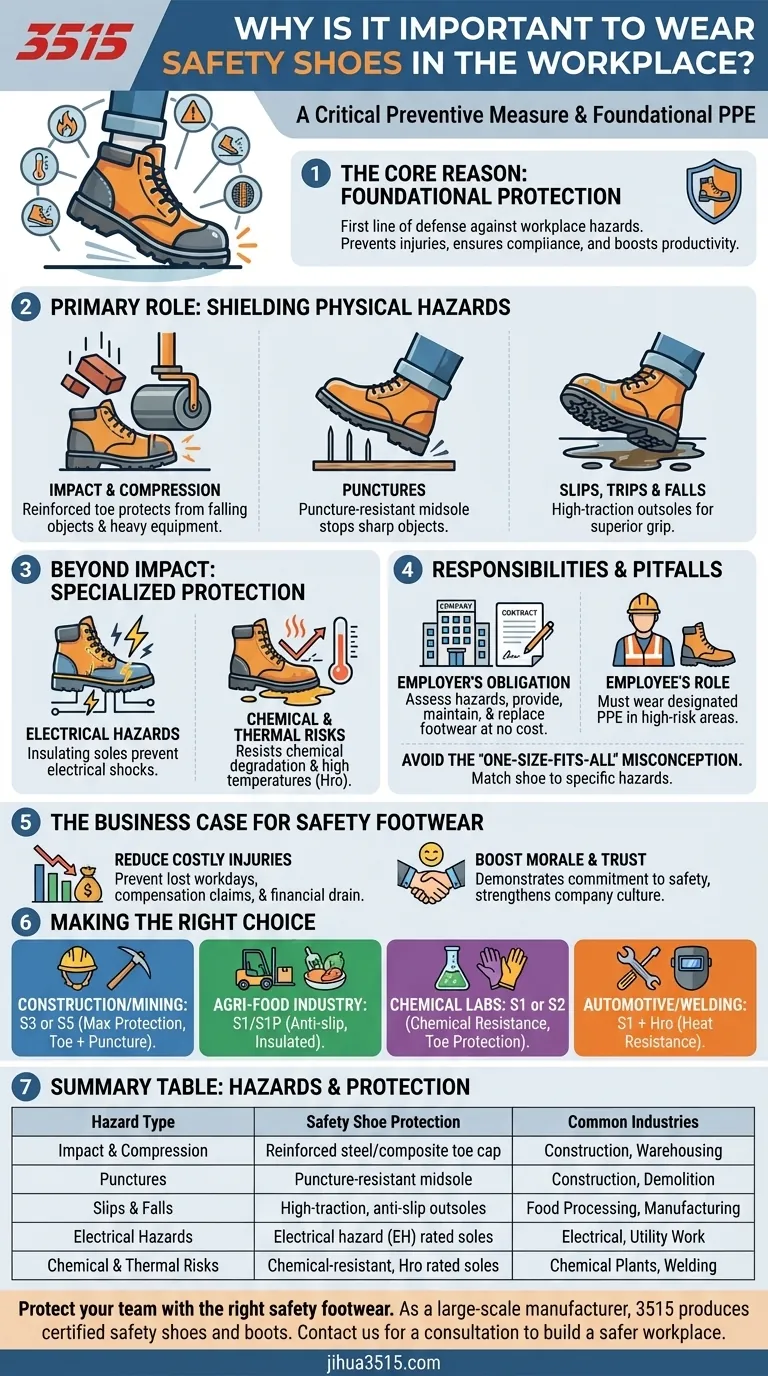
Related Products
- Wholesale Premium Waterproof Nubuck Safety Shoes Boots
- Wholesale Customizable Safety Boots Durable & Protective Footwear Manufacturing
- Advanced KPU Athletic Safety Shoe with Steel Toe Cap Anti-Slip Rotary Lacing System
- Heavy-Duty Waterproof Nubuck Safety Boots Safety Shoes for Bulk Supply
- Wholesale Durable 6-Inch Work Boots | Custom & Private Label Manufacturer
People Also Ask
- What protection do work boots offer against sharp objects? Your Guide to Puncture-Resistant Footwear
- What safety boots are recommended for the manufacturing industry? Ensure Complete Protection & Comfort
- How do safety boots reduce cutting hazards? Essential Protection for Your Workforce
- What does the infographic mentioned in the article cover? Prevent Workplace Foot Injuries with the Right Safety Footwear
- What safety boots are recommended for the construction industry? Ensure Maximum Protection on the Job Site
